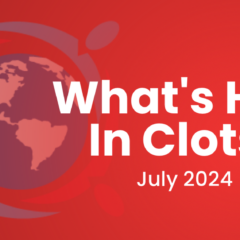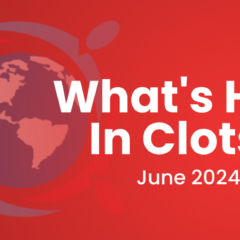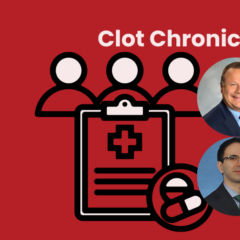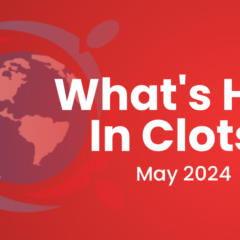Last updated on
What’s Hot in Clots – October 2023
Key Updates in Thrombosis
Table of Contents
- Is Abelacimab blossoming as the future of anticoagulant therapy?
- Electronic alerts to prevent post-discharge VTE
- Heparin-induced thrombocytopenia: A good figure is worth >1000 words
- Fresh AIR for patients with intermediate-risk pulmonary embolism?
- Another twist in the bivalirudin saga: It may be the best anticoagulant for NSTEMI patients undergoing PCI
Most months, I pick four studies for this blog – but this month, I couldn’t resist covering five! Here we go:
Is Abelacimab blossoming as the future of anticoagulant therapy?
A press release from Anthos Therapeutics (manufacturer of abelacimab, a monoclonal antibody that inhibits factors XI and XIa) suggested that there was overwhelming reduction in major/clinically relevant bleeding events in the phase II AZALEA trial of patients with atrial fibrillation, compared with rivaroxaban. The findings will be reported at AHA 2023. Stay tuned! A phase III trial, LILAC, is also planning to enroll patients who are deemed unsuitable for traditional anticoagulants to abelacimab vs placebo. Read more
Electronic alerts to prevent post-discharge VTE
Full results of a cluster randomized trial (that we covered during AHA 2022) are now available. The study, conducted in four medical centers in New York, suggests that an electronic alert to clinicians prior to discharging high-risk medical patients may improve the appropriate use of post-discharge VTE prophylaxis and reduce VTE events. There was an observation of excess mortality, which may be related to a small number of hospitals within the clusters and the unanticipated occurrence of the COVID-19 pandemic. If validated in other health systems, the results can be practice-changing. Read more
Heparin-induced thrombocytopenia: A good figure is worth >1000 words
Use of graphics is becoming increasingly important in scholarly studies, and some journals are pushing for graphical abstracts, or even illustrated reviews. This one, IMHO, is one of the best! Some of the graphics are dense or text-heavy but others are aesthetically beautiful, as well as concise, cohesive, and pragmatic! Read more
Fresh AIR for patients with intermediate-risk pulmonary embolism?
We briefly discussed the AIR trial results in the blog in July. Now the full results have been communicated. In this randomized trial, hemodynamically stable patients with intermediate-risk PE—who did not have hypoxemia at baseline—were randomized to supplemental oxygen (7 L/min) vs control. Albeit small and lacking a sham treatment, the trial had hints of benefit on short-term echocardiographic metrics. The real question is whether there will be sustainable benefit for patient-important outcomes. Read more
Another twist in the bivalirudin saga: It may be the best anticoagulant for NSTEMI patients undergoing PCI
Let me start with a disclosure – I have been highly involved in this study, although I did not receive financial compensation. And second, not all projects that I have been fortunate to embark on take more than 6 years to complete…this is the most time-consuming study I have ever worked on!
In an individual patient data meta-analysis of large randomized trials of bivalirudin-based vs heparin-based periprocedural anticoagulation for patients with NSTEMI undergoing percutaneous coronary intervention (PCI), we recognized that bivalirudin, compared with heparin, was associated with a substantial reduction in serious bleeding events, without a major difference in ischemic outcomes or mortality. So, perhaps bivalirudin is the safer (better) choice. Read more
For more updates, be sure to subscribe to get the latest updates each month.
Find this information helpful? Please consider making a small donation in support of thrombosis education & resources.

Behnood Bikdeli, MD, MS
Cardiologist, Section of Vascular Medicine, Division of Cardiovascular Medicine, Brigham and Women’s Hospital
Investigator, Thrombosis Research Group, Division of Cardiovascular Medicine, Brigham and Women’s Hospital
Instructor, Harvard Medical School
Investigator, Yale/ YNHH Center for Outcomes Research and Evaluation, Yale School of Medicine
Investigator, Cardiovascular Research Foundation



